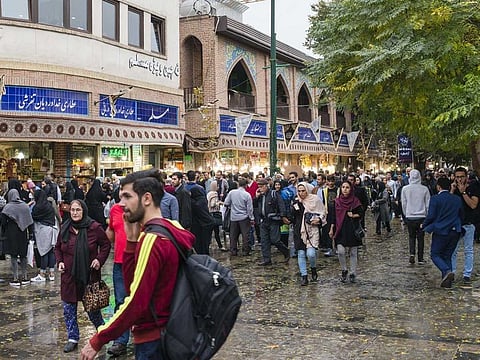Iranian people deserve a better life
A peaceful and prosperous Iran is not only good for Iran, but also for the whole region

I spent the eve of this new year in Dubai with family and friends, and as the new year ushered in by the explosive array of dazzling fireworks which drew gazes of wonderment from all around me, I felt at that moment that the region was beginning to settle down and that peace was much on the horizon. Little did I suspect that more fireworks were being planned just a couple of days ahead, a different kind of fireworks that could possibly throw my sense of peace for the region into total disarray.
On January 3 of the new year, a top Iranian commander was killed in an air strike near Baghdad airport. The drone attack, authorised by the United States president, took out Major General Qasim Soleimani, a commander of Iran’s military forces along with a companion. A statement released by the US Department of Defence following the strike said that “At the direction of the President, the US military has taken decisive defensive action to protect US personnel abroad. This strike was aimed at deterring future Iranian attack plans. The United States will continue to take all necessary action to protect our people and our interests wherever they are around the world”.
With GCC countries aiming to divest their economies of oil, this is not a time to be victimised by new wars that will drain the national economies.Tariq A. Al Maeena, Saudi commentator
In explaining his actions to the American public, President Trump said that “We took action last night to stop a war. We did not take action to start a war.” That did not sit well with Iranian officials. The Iranian Foreign Minister Javad Zarif immediately responded to the attack, calling the US action “an extremely dangerous and foolish escalation”, and that the United States would “bear responsibility for all consequences of its rogue adventurism”. Ayatollah Ali Khamenei, Iran’s Supreme leader, vowed ‘harsh revenge’ adding that Soleimani’s “pure blood was shed in the hands of the most depraved of human beings”.
Call for restraint
World leaders were concerned with the escalation of aggression between Iran and the US, an escalation that many fear could lead to a flashpoint that would be impossible to stop once started. Saudi Arabia called for restraint. The country’s Council of Ministers, chaired by King Salman Bin Abdul Aziz, reiterated the Kingdom’s call for action to achieve regional security and stability and prevent any situation that could lead to heightened tensions in the Middle East. The Saudi Deputy Defence Minister was quickly dispatched to the US to discuss with President Donald Trump the possible fallout following the assassination. He tweeted that he had met and discussed “with Mr Trump aspects of cooperation, coordination and joint work between the two friendly countries in various aspects, including joint efforts to confront regional and international challenges”.
Elsewhere, the office of the British Prime Minister Boris Johnson released a statement that said, “The PM underlined the importance of de-escalation to avoid further conflict and the need for a diplomatic solution to the crisis.” And in a unified statement, leaders of Germany, France and the UK issued a joint statement: “There is now an urgent need for de-escalation. We call on all parties to exercise the utmost restraint and responsibility.” They also cautioned Iran that “all calls for retaliation or reprisals will simply lead to more violence in the region and they are in no one’s interest”.
Also Read: Trump’s ground game against Iran
Will Iran heed their calls or will it be fuelled by the fire of vengeance? Some suspect that Iran would more than likely retaliate by raising the bar with terrorism and cyberattacks, and specifically against US interests in the region.
Such a scenario does not spell good tidings for Iran’s neighbours, who have all witnessed the fallout from the ill-fated adventure into Iraq back in 2003 which spawned terror groups that today haunt different corners of the globe. Nor does it spell business confidence in the region, as foreign investors are more than likely to be easily spooked at the hint of another war. With GCC countries aiming to divest their economies of oil, this is not a time to be victimised by new wars that will drain the national economies.
Iran’s people deserve a better life, a life denied them by decades of intransigence by their leading mullah leaders. Theirs is a country rich in history, culture and natural resources. Unfortunately, the country has been guided down the wrong path and its people must now wrest control of their country and sideline their religious leaders if they are to progress. Ratcheting up tensions with their neighbours is not the way. A peaceful and prosperous Iran is not only good for Iran but also good for the region.
— Tariq A. Al Maeena is a Saudi socio-political commentator. He lives in Jeddah, Saudi Arabia. Twitter: @talmaeena.


